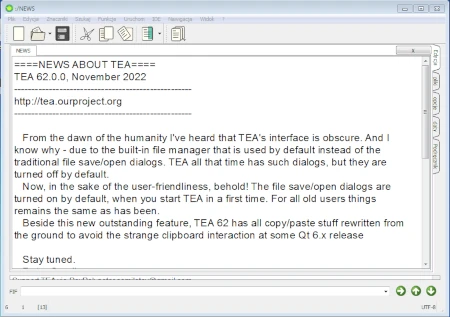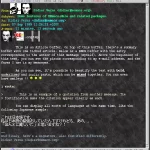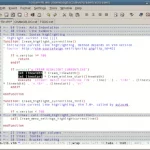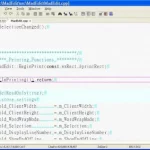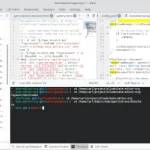Web site: tea.ourproject.org
Category: Office
Subcategory: Text Editors
Platform: Linux, Unix-like, BSD, Windows
License: GNU GPL
Interface: GUI
Wikipedia: TEA (text editor)
First release: 2001
TEA Editor – a cross-platform text editor. It features a large number of functions and a somewhat unusual interface. In particular, it performs many functions of a file manager and image viewer.
Written in C++ using Qt and compiled into one relatively small executable. Runs on Linux, Windows, macOS, Haiku, and OS/2. Distributed under the terms of the GPL.
The editor is available in the repositories of a number of Linux distributions, including Debian and Ubuntu.
The text editor supports syntax highlighting for markup languages such as LaTeX, DocBook, MediaWiki markup, XML and HTML/XHTML as well as LilyPond and Lout. Supported programming languages (generic and specialized) include AWK, C, C++, Bash, BASIC, C#, D, Fortran, Java , Lua , NASM, NSIS, Pascal, Perl, PHP, R, Seed7, Vala, Verilog and Translation PO files for gettext.
It supports a multi-document tabbed interface, basic editing and spell checking, bookmark navigation, work with snippets and a wide range of specialized functions: from HTML tools to Morse code support. A special, automatically saved crapbook.txt file (in a Russian version of the interface, opened using the “Bullshit” menu item) is used for quick storage of various notes and text fragments and can serve as a simple replacement for a clipboard manager such as Parcellite for Linux.
Sufficiently rich built-in features of the editor can be extended using scripting languages (Python, Perl, Ruby and Bash) installed in the system, plug-ins written in QML, and also by writing xml files containing syntax highlighting rules.

